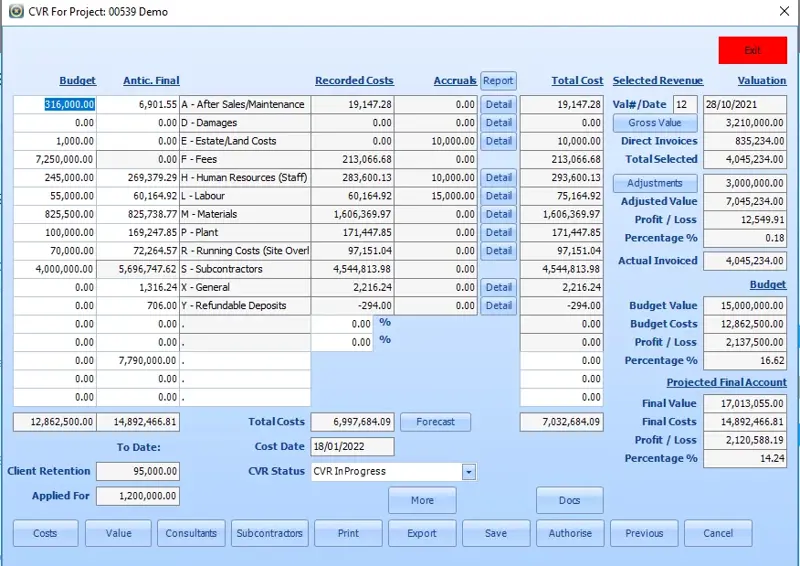
What Is Cost Value Reconciliation (CVR) In Construction?
Cost Value Reconciliation (CVR) is the process of comparing the actual cost of construction with its estimated cost. CVR helps project managers determine whether the project is over or under-budget and identify any areas where adjustments need to be made.
Put simply, the process involves analysing the work completed, comparing it with the budget, and identifying any discrepancies.
 3 mins
3 mins
Written by Carol Massay
Why Is Cost Value Reconciliation Important In The Construction Industry?
Cost value reconciliation (CVR) is essential to the construction industry as it helps to ensure that a construction project is completed on time, on budget and within expected profit margins. CVR allows contractors to periodically assess the progress of their projects and ensure that they are not overspending or under-spending. It also helps to identify any potential risks that could lead to cost overruns, rework and delays.
Profit margins within the construction industry are razor-thin, and CVR is essential to maintaining those margins – and identifying costly elements of a project.
By regularly generating CVR reports, construction contractors can ensure that they are delivering projects in the most cost-effective and timely manner possible.

Which Metrics Are Tracked By CVR?
CVR can track a range of different construction project metrics such as:
- Project costs
- Resource utilisation
- Project quality
- Customer satisfaction
- Project timelines
However, the 3 key ingredients a CVR must include are:
- The value of a construction project
- The costs of a construction project
- The cashflow of the project
The Value Of A Construction Project
In summary, the value of the project is all project incomes combined. The report often includes all the received amounts, as well as any potential incomes at the end of the project.
The Costs Of A Construction Project
Cost is an integral element of CVR. A CVR compares the cost of work to the actual work delivered within the project-to-date.
Your Cashflow
When reviewing the previously mentioned key ingredients (Value and Cost of project), you are able to get a good view of the balance of your construction project. This will then give you an understanding on where the cashflow is at for the construction project.
Current cashflow of a project = current value – current costs

Accurate, Real-Time CVR Reporting With Access COINS ERP
Automatically calculate and update CVR and produce CVR reports at the click of a button with Access COINS, the ERP built for construction.
How is CVR carried out in Construction?
CVR is carried out in several stages.
Firstly, Contractors need to establish a baseline budget for the project. This involves creating a detailed estimate of the costs involved in the project, including labour, materials, equipment, and overheads.
Once the baseline budget has been established, project managers need to track the actual costs of construction. This involves accurately recording all expenses related to the project, including labour costs, material costs, and equipment costs. Contractors also need to track the progress of the project to ensure that it is on schedule.
Once the actual costs have been recorded, project managers can carry out a Cost Value Reconciliation. This involves comparing the actual costs with the baseline budget and identifying any discrepancies.
If the actual costs are higher than the baseline budget, project managers need to identify the reasons for the cost increase and take corrective measures, such as reducing costs or increasing efficiency. If the actual costs are lower than the baseline budget, project managers need to identify the reasons for the cost savings and determine how to allocate the savings.
What Are The Advantages and Disadvantages of Cost Value Reconciliation (CVR?)
Advantages of CVR
Controls Ongoing Costs
Particularly over the last few years there has been a huge amount of worldwide disruption which has seen large increases in material costs, energy costs and labour costs . Keeping control of ongoing costs has never been more important to construction companies. CVR ensures ongoing costs can be tracked and monitored closely to ensure the construction project stays on course.
Minimises Overspend
CVR reports are traditionally produced on a monthly basis throughout a construction project. This regularity means that costs are frequently reviewed, and any required adjustments/actions are put in place to ensure that overspend is less likely at the end of projects.
Helps Construction Firms Price Future Projects Accurately
Because CVR is a documented/recorded process, construction companies are able to use previously produced CVR reports as guidance on how to correctly cost future construction projects. CVRs are great for understanding previous mistakes and improving cost evaluations for the future.
Disadvantages of CVR
Human Error Can Lead To Miscalculation
Many construction companies build their CVR reports in Microsoft Excel, which relies on manual data entry, which in turn increases the risk of human error in the process. These errors can lead to miscalculations and incorrect costings later down the line with final reports.
To reduce this risk, construction companies are use software such as ERP (enterprise resource planning) to automatically collect and calculate financial data across a range of sources.
CVR Needs Resources
In most construction companies, a member of the finance team has the responsibility for CVR reporting. This involves gathering required information from multiple teams, inputting data, generating and editing reports and circulating regular reports to the relevant stakeholders.
It goes without saying that CVRs require a lot of work, diligence and resource to get the most out of them.
The good news is there are solutions out there to simplify the CVR reporting process – learn more about our construction financial software, with features built to help automate CVR calculation and reporting.
More construction software information, guidance and advice






